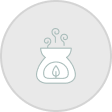Traditional herbal medicine, based on centuries of experience, is also known as "monastic medicine" because it was formerly v.aThe monasteries were the ones that preserved and expanded knowledge of herbal medicine. Perhaps the best-known representative of monastic medicine is Hildegard von Bingen (1098-1179), who is generally considered to have founded European naturopathy. Besides plant products, minerals, trace elements, and essential fatty acids, other medicinal substances are also used. v.aVitamins are also among the so-called "micronutrients" that are essential for the body.
The term "vitamins" encompasses a wide variety of organic compounds essential for metabolism. Despite their diversity, vitamins share the common characteristic of not serving as energy sources, but rather fulfilling very specific functions, such as acting as antioxidants to protect against free radicals. A vitamin deficiency can lead to illness even with an adequate intake of energy-providing fats, proteins, and carbohydrates. With the exception of vitamin D, which the body can produce itself with the help of sunlight, all other vitamins must be obtained through food. Vitamins can be either fat-soluble or water-soluble, but only fat-soluble vitamins (vitamins A, D, E, and K) can be stored in the body (with the exception of the water-soluble vitamin B12).
 based on
Reviews
based on
Reviews









